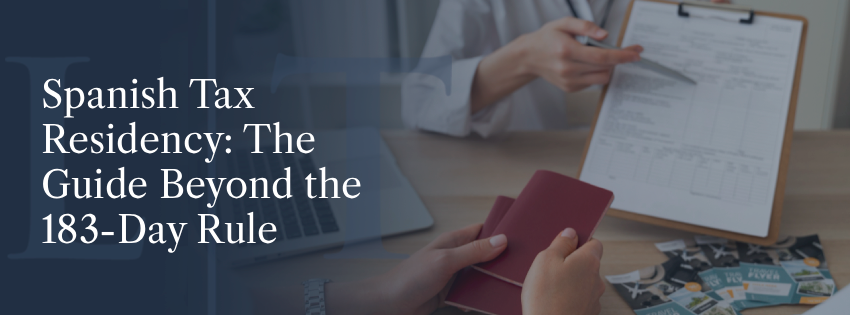Moving to Spain is a dream, but for digital nomads, investors, and expatriates, navigating its tax law can be a minefield. The most common and dangerous trap is believing the 183-day rule is the only factor that determines your tax obligations. It isn’t.
Understanding your fiscal residency is the single most important step to protect your assets and ensure compliance. This guide breaks down the key legal criteria, recent court rulings, and the strategic steps you must consider.
First, let’s clarify the fundamental distinction:
- Legal Residency: Your right to live in Spain (e.g., a visa, TIE card). This is an immigration status.
- Fiscal Residency: Your obligation to pay taxes in Spain on your worldwide income. This is determined by a separate set of tax laws.
Confusing the two is a frequent and expensive mistake.
Unsure About Your Tax Status in Spain? An incorrect tax residency classification can lead to severe penalties. Get clarity and protect your assets with a strategic assessment from our experts.
Schedule Your Confidential Consultation
The 3 Official Criteria for Spanish Tax Residency
Spanish law establishes three tests to determine if you are a tax resident. If you meet just one of them, you are considered a resident for tax purposes.
1. The 183-Day Physical Presence Rule
This is the most well-known rule: spending more than 183 days in Spain during a calendar year makes you a tax resident. However, the calculation is complex:
-
- Sporadic Absences Count: Short trips out of Spain do not «reset the clock.» The Spanish Tax Agency (Agencia Tributaria) will count these as days of presence unless you can prove tax residency in another country.
- The «Presumed Days» Doctrine: This is a critical tactic used by tax inspectors.
If the Tax Agency can prove you were in Spain on two separate dates (e.g., a credit card payment on Monday and a flight on Friday), they will legally presume you were in Spain for all the days in between. The burden then shifts to you to provide hard evidence (like flight tickets) that you were physically elsewhere.
2. The Center of Economic Interests
If you don’t meet the 183-day rule, the Tax Agency will analyze where the «main nucleus of your economic interests» is located. This means they compare your economic ties in Spain directly against your ties in one other country. The analysis gives significantly more weight to active economic interests in Spain (like a business) than to passive, mobile wealth (like a stock portfolio) held abroad, even if the foreign portfolio is larger.
3. The Family Connection Presumption
The law presumes you are a tax resident in Spain if your non-legally separated spouse and/or dependent minor children reside here. This is a powerful presumption that shifts the burden of proof entirely onto you to demonstrate that your tax home is elsewhere.
Your Ultimate Defense: The Foreign Tax Residence Certificate
If you face a potential dual-residency conflict, obtaining a tax residence certificate from another country is your most powerful shield.
A landmark ruling from the Spanish Supreme Court established that if the certificate is from a country with a Double Taxation Agreement (DTA) with Spain, the Spanish Tax Agency cannot ignore it. This forces them to resolve the conflict by strictly applying the tie-breaker rules in the treaty, providing you with crucial legal certainty.
Modern Challenges: Digital Nomads and Special Regimes
Remote Work & Digital Nomads
A binding ruling from the Spanish tax authorities confirmed that the decisive factor for taxing employment income is where the employee is physically present while working. If you become a Spanish tax resident, the salary corresponding to the days you physically work from Spain is taxable in Spain, regardless of where your employer is located.
The Beckham Law: A Special Tax Regime
This special regime allows eligible individuals who become Spanish tax residents to be taxed similarly to non-residents for up to six years. This means they are typically taxed only on their Spanish-source income at a flat rate, offering significant tax savings.
Frequently Asked Questions (FAQ)
Does my Spanish residence permit (TIE) automatically make me a tax resident?
No. A residence permit is an immigration status. Tax residency is determined separately by the three criteria: physical presence, economic interests, or family ties.
What are «presumed days» of presence?
It’s a legal doctrine where if tax authorities prove you were in Spain on Day 1 and Day 10, they assume you were also present on Days 2-9, unless you provide undeniable proof you were physically outside Spain.
How powerful is a foreign tax residence certificate?
It is the most powerful evidence you can have. According to the Spanish Supreme Court, a certificate from a treaty country is binding and forces the Spanish tax authorities to apply the treaty’s tie-breaker rules to resolve dual-residency cases.
I work remotely from Spain for a UK company. Is my salary taxable here?
Yes. If you are a Spanish tax resident (e.g., you stay over 183 days), the portion of your salary earned while physically working in Spain is subject to Spanish income tax.
Your Strategic Next Steps: From Confusion to Clarity
Relying on simplified notions like the 183-day rule is a high-risk strategy. A proactive, well-documented approach is essential.
- Build a «Residency Defence File»: From day one, meticulously collect evidence of your whereabouts, such as travel tickets, passport stamps, and detailed credit card statements from physical locations.
- Prioritize Your Tax Certificate: Make obtaining a tax residence certificate from your home country your top priority.
- Seek Expert Guidance: The interaction between domestic law and international treaties is complex.
Don’t let tax uncertainty undermine your life in Spain.
Ready to gain clarity? Contact Lextax today for a strategic residency assessment.


